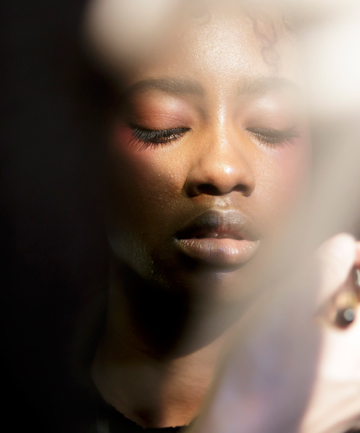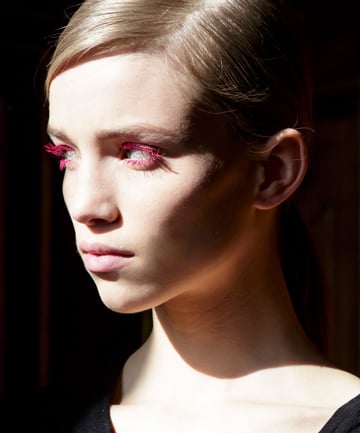A breakout.
Or, rather, a slew of them along my jawline, forming a constellation of imperfection. They are red and blotchy, and though I just turned 30, my hormones continue to cause these incessant zits consistently. I've tried everything—Proactiv, Accutane, tea tree oil, antibiotics, serums, creams, lasers, cutting out dairy, you name it—and, well, I've succumbed to the fact I might never have smooth pores. Admittedly, as I've aged (and after Accutane) my skin has become less cystic but still: an untimely breakout can distract me from nearly everything else positive about my life.
My skin has always been my greatest complaint about my appearance and the one aspect that has the power to transform my self-worth and perception. Though overall, I consider myself attractive, I'm constantly comparing myself to women (and to my friends) who seemingly have perfect skin. I will only take a selfie or a picture in certain lighting, much to the annoyance of those I love. I usually turn with my back to the camera for posting on Instagram, for fear the blisters will shine through any filter I apply. I usually use a dot of concealer to do most things—even hiking this morning—as it makes me more comfortable. I get visibly annoyed with my besties when they encourage me to skip makeup, growling with envy at their no-makeup-needed skin. I sometimes avoid mirrors when my skin is especially bad and have even been known to cancel dates, happy hours or adventures if I'm feeling down about it.
While I would never argue my poor self-esteem in this area of my life is comparable to a traumatic event, skin has a major impact on our sense of worth and value. In honor of Mental Health Awareness Month, I spoke with psychologists to better understand how common this type of struggle is, and for my own happiness and health, how to better cope. If you suffer from acne that creates doubts about your beauty, may this guide give us a shimmer of hope and reminder that even with zits of all shapes and sizes—we're all still gorgeous.
Image via Emilija Manevska/Getty
Psychologist Yvonne Thomas, PhD says it is normal for acne to affect self-esteem since our physical characteristics can often contribute to our inward confidence. “A person can feel unattractive and undesirable and have a negative image of how they look. And sometimes, the person can, on a more global overall basis, not feel likable or even lovable and may be very self-conscious of how one's imperfect skin looks in both their own and the world's view of them,” she says.
These insecurities can cause normally self-assured individuals to stumble when they’re experiencing a breakout. Whether you feel unnerved speaking in front of your colleagues or believe the reason you’re still single is due to the condition of your skin, it can be debilitating and, at times, keep you from enjoying the activities and experiences you love.
Image via ImaxtreeAs licensed clinical psychologist Dr. Sarah Schewitz puts it, it is pretty impossible to avoid feeling self-conscious when our skin is breaking out. “No one likes to feel unattractive and, unfortunately, blemishes have been deemed unattractive in our society even though many people struggle with problem skin,” she says.
Thomas agrees, adding that nearly anyone who breaks out regularly, is diagnosed with eczema, psoriasis or was born with an unfortunately-placed birthmark will probably see a dip in their internal morale.” As a consequence, the person may feel embarrassed, ashamed and wanting to hide. "Their confidence in how they look and how others see them can be significantly lowered,” she adds.
Image via Imaxtree
Over nearly two decades, I've developed a few personal ways to feel better about my skin. The first, most important and most painful to master is going without makeup. It might seem easy to some but even with new friends, it usually takes a while before I allow them to see my "naked" skin. Same goes with men I'm dating or, really, anyone in my life. What I've found by giving my pores more breathing room is they will—naturally—clog up less. Though no matter what I eat, what I apply, how little or how much makeup I wear, I will always break out around my period, bravely going bare-faced has made an impact on my skin and my sense of self.
The other is focusing on positive self-talk. This isn't easy either but as the saying promises, it gets easier with practice. When I start to be unkind to myself, I try to focus on the qualities I'm proud of: my writing talent, my ability to be an excellent best friend, my left hook, my courage to travel anywhere and everywhere, and my loving nature. When I turn the attention away from my one problem area, I can see the beauty in the others.
Image via Imaxtree
For many people, the first step in improving their skin-related mental health issues is professional treatment. Making the decision to go on Accutane a few years ago was a taxing one but, ultimately, the best solution to give myself a fighting chance at clear skin. Though it didn't solve it completely, it made a big improvement. Thomas says seeking the help of a dermatologist can create a game plan for your specific needs. Apart from the obvious medical benefit, she says the act of going can be encouraging in itself. “By gaining control of the parts within your reach, you can start to build more positive feelings and self-confidence,” she says.
And though you might feel alone surrounded by your gaggle of gals who don’t think twice about leaving the house with merely mascara on, Thomas urges those with problematic skin to remember there is strength in numbers. “You can talk to others who are battling this, be it family, friends and also join a support group. By doing either idea or both, you can connect to others and get comfort and reassurance, which can help decrease negative feelings and beliefs about yourself and your skin situation,” she says.
Another way to deal with accepting yourself—zits and all—is to write down one positive aspect about yourself every single day. Schewitz says by amplifying the positive, your imperfections will become less and less challenging. When you doubt it all, ask those who love you for everything you are. They will be your cheerleaders and help you see the larger picture. As Schewitz says, “Surround yourself with people who love and accept themselves and who don’t focus on looks to remind you that there is more to you than what people see on the outside.”
Image via Imaxtree









